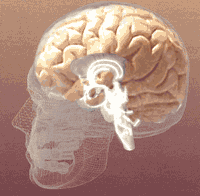-
- Feels sad or down
- Has decreased interest and enjoyment
- Experiences decreased energy
- Feels guilty or worthless
- Thoughts about death and suicide
 |
| from http://i12.photobucket.com/albums/a210/JRuff/Other%20Images/TandP%20Screengrabs/Animated%20gifs/tmn-looking_back.gif |
 |
| from http://fc09.deviantart.net/fs70/f/2010/239/1/2/death_art_anim_gif_800p_by_syntheticidentity-d2xey6r.gif |
Major Depression is quite common in that 10% of the general population may experience it at some time in life. In 50% of cases, major depression is recurrent; that is, half the people will experience more than one episode.
 |
| from http://faculty.irsc.edu/faculty/sschwartz/ANIMATED_NEVE_IMPULSE.gif |
BIPOLAR DISORDER
This illness used to be called manic-depressive illness. There are several phases:
Manic Phase:
-
- Feelings of euphoria
- Irritability
- Grandiosity-having an exaggerated belief in one's importance, sometimes reaching delusional proportions, and occurring as a common symptom of mental illnesses, as manic disorder
- Increased energy
- Increase in talkativeness
- Decreased need for sleep
- Increase in goal-directed activity (which may have positive or negative consequences such as shopping sprees)
 |
| from http://fc09.deviantart.net/fs70/f/2010/062/a/0/Splat_by_UnamedKing.gif |
- Same as major depression
- Usually less severe symptoms
- Many recover completely
- May look different for different individuals
 |
| from http://www.brainchannels.com/evolution/evolutionmedia/serotonin.gif |
It is a chemical imbalance in the brain with an excess of the neurotransmitter serotonin. Genetics play a strong role but family history is not always present. It may also be influenced by stress.
Course of Illness:
There may be an increase in episodes with age but the illness is usually better controlled with treatment over the years.

No comments:
Post a Comment